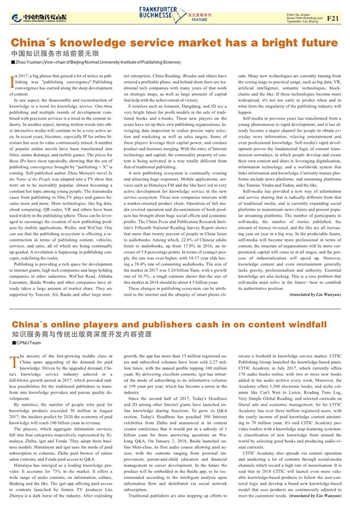The anxiety of the fast-growing middle class in China spurs upgrading of the demand for paid knowledge. Driven by the upgraded demand, China's knowledge service industry ushered in a full-blown growth period in 2017, which provided endless possibilities for the traditional publishers to transform into knowledge providers and pursue quality development.
By statistics, the number of people who paid for knowledge products exceeded 50 million in August 2017; the insiders predict by 2020 the economy of paid knowledge will reach 100 billion yuan in revenue.
The players, which aggregate infomation services, fall into four categories respectively represented by Ximalaya, Zhihu, iget and Fenda. They adopt three business models. Himalayan and iget uses the mode of paid subscription to columns, Zhihu paid browse of online salon contents, and Fenda paid access to Q&A.
Himalaya has emerged as a leading knowledge provider. It accounts for 73% in the market. It offers a wide range of audio contents, on information, culture, thinking and the like. The iget app offering paid access to contents launched by former TV producer Luo Zhenyu is a dark horse of the industry. After exploding growth, the app has more than 13 million registered users and subscribed columns have been sold 2.27 million times, with the annual profits topping 100 million yuan. By delivering excellent contents, iget has initiated the mode of subscribing to its informative columns at 199 yuan per year, which has become a norm in the industry.
Since the second half of 2017, Today's Headlines and JD among other Internet giants have launched online knowledge sharing functions. To grow its Q&A section, Today's Headlines has poached 300 Internet celebrities from Zhihu and announced at its content creator conference that it would put in a subsidy of 1 billion yuan for those answering questions on Wukong Q&A. On January 2, 2018, Baidu launched online Mini-class, its first audio course allowing paid access, with the contents ranging from personal improvement, parent-and-child education and financial management to career development. In the future the product will be embedded in the Baidu app, to be recommended according to the intelligent analysis upon information flow and distributed via social network subscription.
Traditional publishers are also stepping up efforts to secure a foothold in knowledge service market. CITIC Publishing Group launched the knowledge-based punit, CITIC Academy in July 2017, which currently offers 170 audio books online, with two or more new books added in the audio archive every week. Moreover, the Academy offers 1,500 electronic books, and niche columns like Can't Wait to Listen, Reading Time Lag, Very Simple Global Reading, and selected curricula on liberal arts and economic management. So far CITIC Academy has over three million registered users, with the yearly income of paid knowledge content amounting to 70 million yuan. It's said CITIC Academy provides readers with a knowledge map featuring systematic classification of new knowledge from around the world by selecting good books and producing audio-visual curricula.
CITIC Academy also spreads via content operation and marketing a lot of contents through social-media channels which record a high rate of monetisation. It is said that in 2018 CITIC will launch even more valuable knowledge-based products to follow the user-centered logic and develop a brand new knowledge-based model that sees products are continuously adjusted to meet the customers' needs.(translated by Liu Wanyun)


